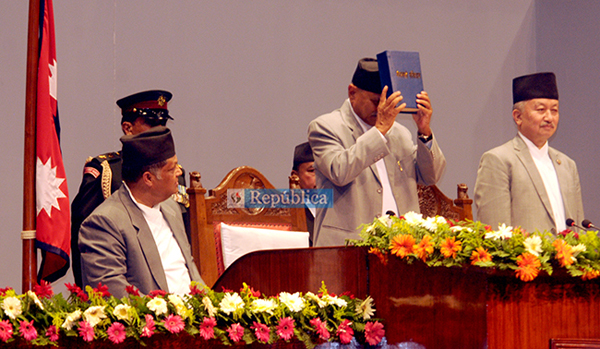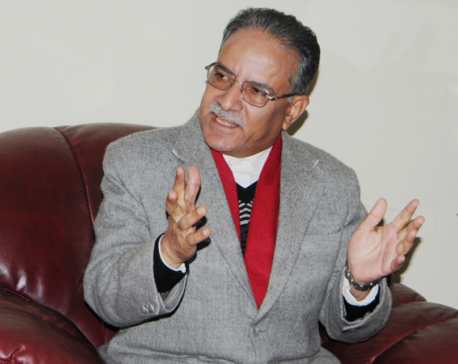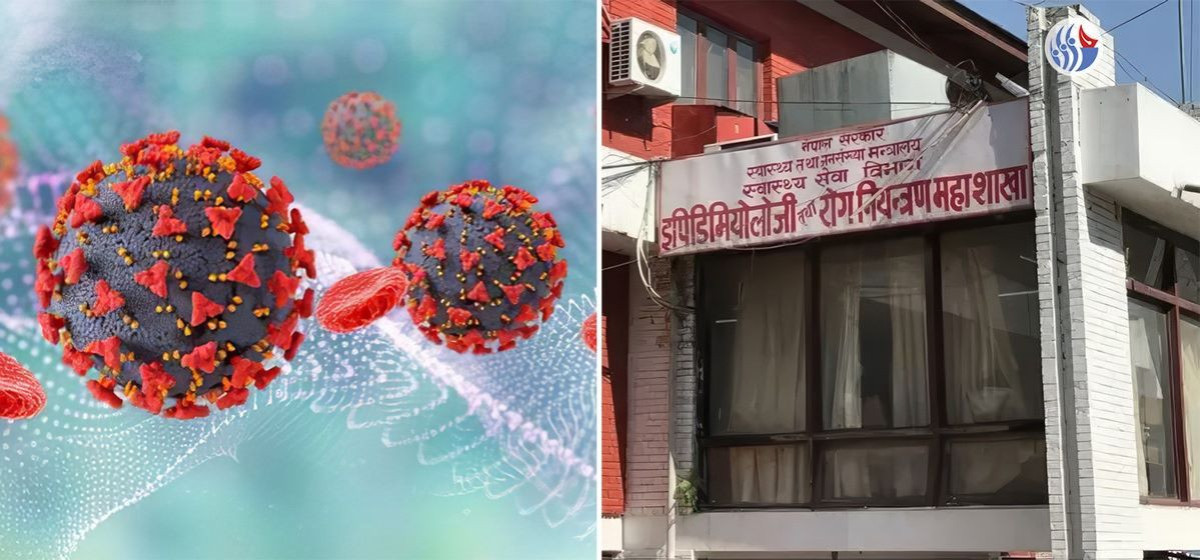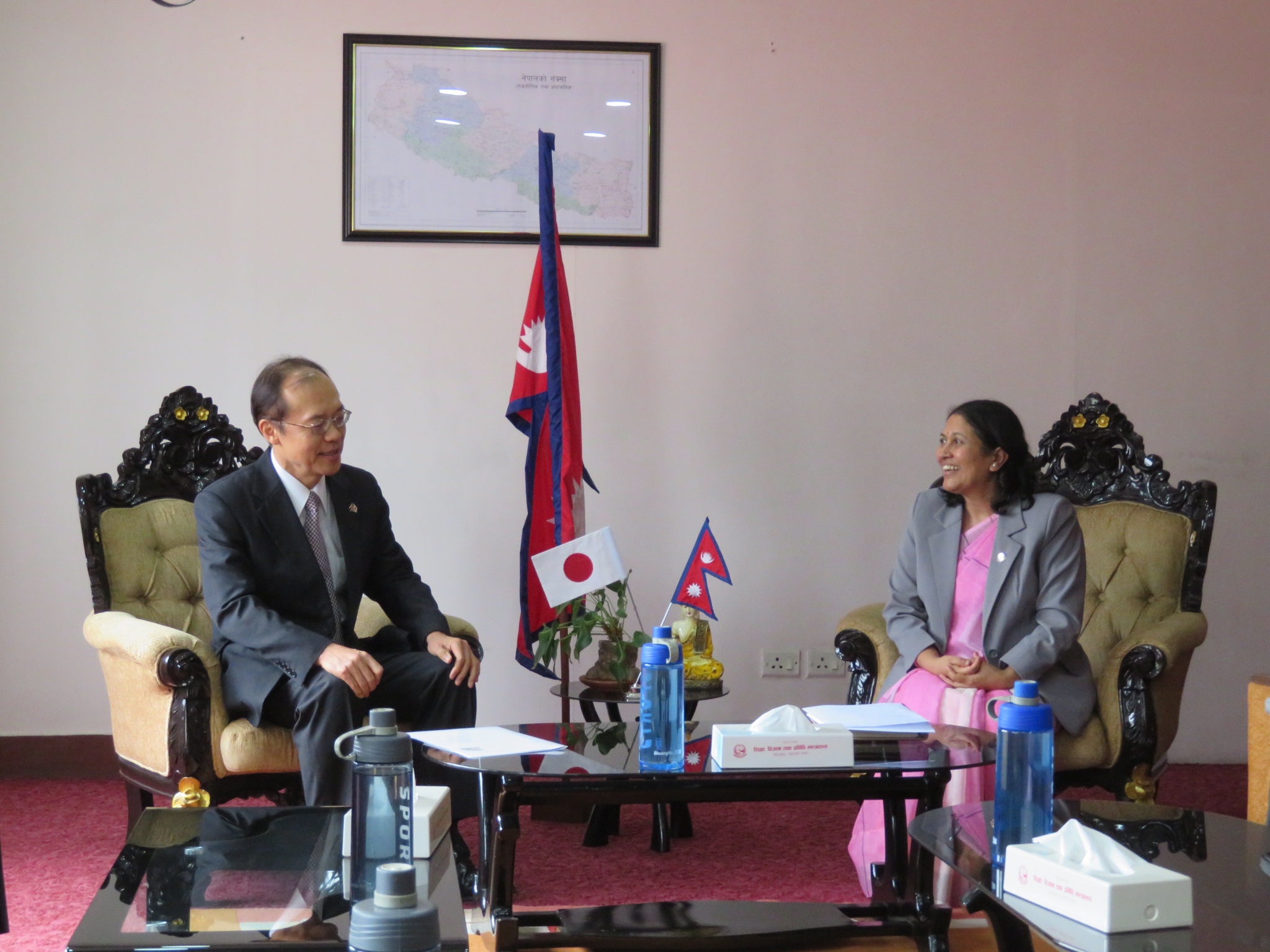
OR
Commentary
Inter, intra-party tussles snag constitution execution
Published On: August 17, 2016 01:40 AM NPT By: Nabin Khatiwada

KATHMANDU, Aug 17: A transitional provision in the Constitution has set a deadline of January 21, 2018 for electing the new House of Representatives, and several other laws should be in place by then for the smooth functioning of the new statute.
Holding elections for local level bodies and provincial assemblies are likewise important tasks that need to be completed. However, the political parties are preoccupied in inter-party and intra-party conflicts and constitutional experts say that this state of affairs could pose a serious threat to the implementation of the Constitution.
"Unless elections are held for the House of Representatives within the set deadline, we will not be able to say that the Constitution has actually been implemented. If the elections are not held in time, there is a risk of losing the achievements secured through the Constitution," said constitutional lawyer Bhimarjun Acharya.
"There is only one month left for forming the high courts as per the deadline set by the Constitution. However, the engagement of political parties in inter-party and intra-party conflicts has started posing a threat to the settlement of such crucial issues," he added.
Inter-party and intra-party conflicts are increasing of late and party leaders are taken up in a war of words although various crucial deadlines for the implementation of the Constitution are fast approaching.
Nepali Congress (NC) and the CPN (Maoist Center), while electing Maoist Center Chairman Pushpa Kamal Dahal as prime minister, reached an agreement with the agitating Madhes-based parties to amend the Constitution through political consensus. However, the CPN-UML, which has settled into its role as as the main opposition party after the new coalition forced its chairman KP Sharma Oli to step down as prime minister, has already asked the ruling coalition to substantiate the need for a constitutional amendment.
"We are always ready to amend the constitution if a need for this is demonstrated. But, we will not be ready to amend the Constitution just to satisfy the ego of some politicians," said UML leader Agni Kharel, who was minister for law and justice in the Oli government.
UML Chairman Oli has already alleged that the new government does not have a plan for implementing the Constitution and holding elections on time. He has also urged his party cadres to be ready for protest activities in the coming days.
The political confrontations are not limited to the verbal level. Some leaders have sought judicial reviews over different issues.
As expected, the new government withdrew the recommendations for appointment as ambassadors to various countries made by the Oli government. However, four of the individuals recommended, including UML Central Committee member Yubaraj Karki and Shiva Maya Tumbahamphe, filed writ petitions at the Supreme Court on Monday challenging the government's withdrawal of their recommendations.
NC and the Maoist Center formed the new government after reaching a seven-point agreement, which mainly focuses on concluding the peace process through consensus. But a section of NC leaders is clearly against the agreement. As a result, NC leaders Kul Bahadur Gurung and Binaya Dhoj Chand, in association with other conflict victims, filed a writ petition at the Supreme Court challenging the budget allocation for relief payment to the discharged Maoist combatants. The government's annual budget speech had announced that a sum of Rs 200,000 would be provided to each discharged combatant.
Apart from the inter-party conflicts, the leaders are also engaging in intra-party tussles. Dissatisfaction has surfaced within the Maoist Center regarding the selection of ministers, while the NC has so far sent only two ministers into the new government because of internal conflicts regarding the general convention of party sister wing Nepal Student Union. Within the main opposition UML also, a fraction led by senior leader Madhav Kumar Nepal has been criticizing Chairman Oli for running the party and the recently ousted government unilaterally. Nepal, during his deliberations in Parliament on the no-confidence motion against Oli, said that the government was run by the Oli fraction, not by the UML.
However, political analyst Jhalak Subedi said that the intra-party conflict is less serious at present than the intra-party conflict. "In the past, there was serious intra-party conflict within the Maoist party and this hampered the constitution drafting process during the first Constituent Assembly.
However, there is no serious intra-party conflict in any major party at present," said Subedi, adding, "However, such conflict is now growing. The main opposition UML has already started upbraiding the ruling coalition as though it (UML) had already done everything needed for holding elections."
"Elections seem impossible without bringing the Madhes-based parties on board, and this in turn depends on the UML's stance. However, the UML seems bent on protecting its vote bank rather than reaching any consensus," he added.
Subedi also said that inter-party conflicts within the agitating Madhes-based parties will likewise be critical for the future course of the country.
"The Madhes-based parties want all their demands fulfilled right now. They are saying 'now or never'. On the other hand, inter-party conflict and vote bank politics among Madhesi leaders have been hindering the search for a solution," he said.
You May Like This

Intra-party tussles widen in RJPN, FSFN
RAJBIRAJ, September 7: With the third phase of local elections now just 11 days away, intra-party rifts have widened in... Read More...

Intra-party tussles widen in RJPN, FSFN
RAJBIRAJ, Sept 5: With the third phase of local elections now just 12 days away, intra-party rifts have widened in the... Read More...

PM urges media to play positive role in constitution execution
KATHMANDU, Jan 30: Prime Minister Pushpa Kamal Dahal has appealed to the media to play a supportive and positive role in... Read More...











Just In
- Nepal at high risk of Chandipura virus
- Japanese envoy calls on Minister Bhattarai, discusses further enhancing exchange through education between Japan and Nepal
- Heavy rainfall likely in Bagmati and Sudurpaschim provinces
- Bangladesh protest leaders taken from hospital by police
- Challenges Confronting the New Coalition
- NRB introduces cautiously flexible measures to address ongoing slowdown in various economic sectors
- Forced Covid-19 cremations: is it too late for redemption?
- NRB to provide collateral-free loans to foreign employment seekers







Leave A Comment